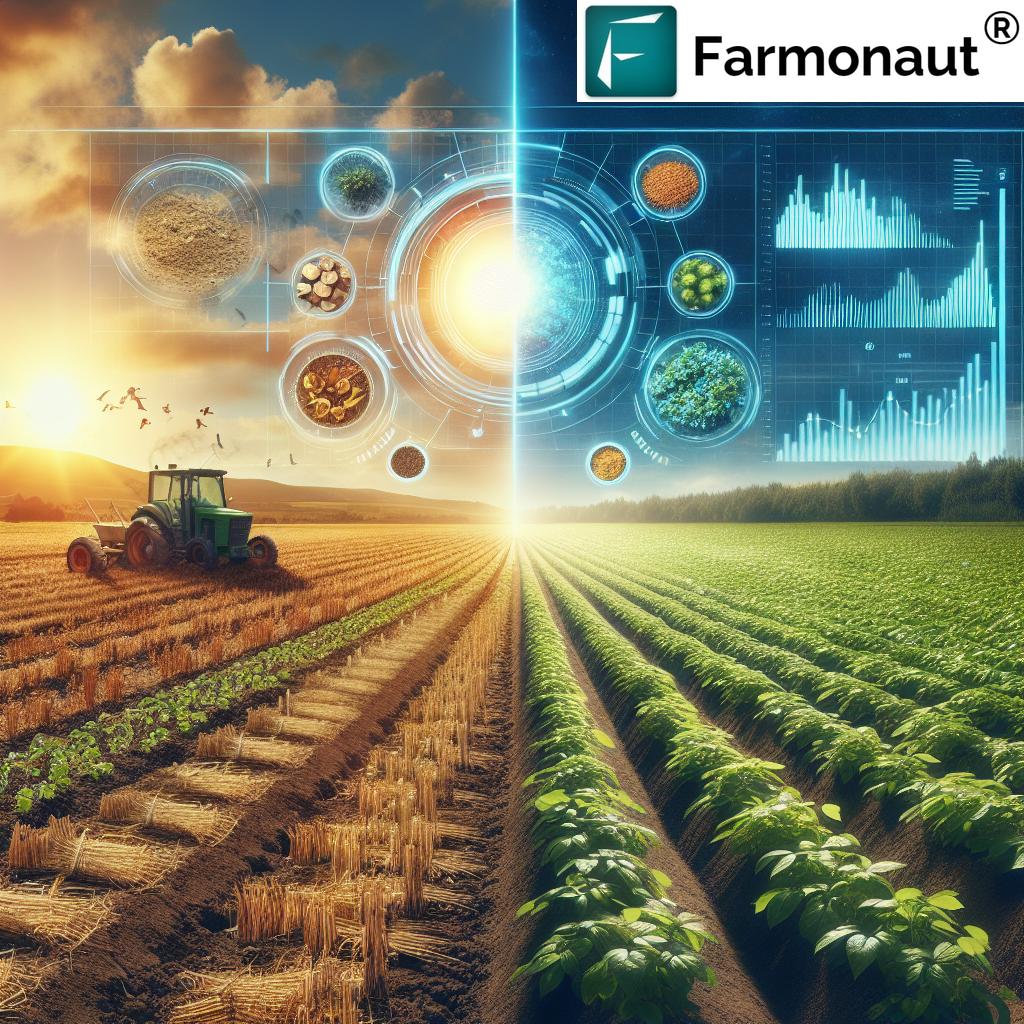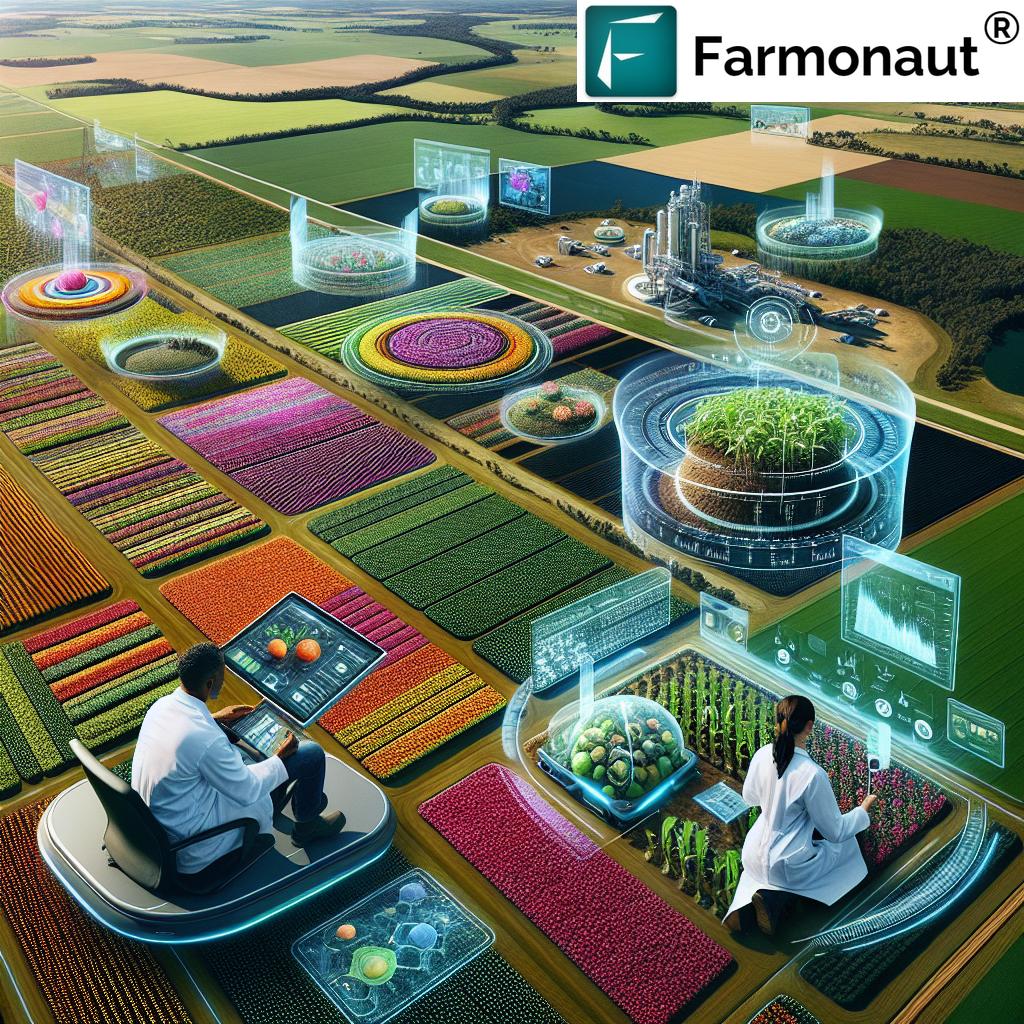Revolutionizing Australian Agriculture: How Scientific Soil Testing Enhances Crop Nutrition and Sustainable Farming Practices

As we celebrate World Soil Day, it’s crucial to shine a spotlight on the revolutionary advancements in scientific soil testing and their profound impact on Australian agriculture. In this comprehensive exploration, we’ll delve into how cutting-edge technologies and innovative approaches are transforming crop nutrition optimization and promoting sustainable farming practices across the vast landscapes of Australia.
“Scientific soil testing can increase crop yields by up to 25% through optimized nutrient management and fertilizer strategies.”
At Farmonaut, we’re at the forefront of this agricultural revolution, leveraging advanced technology to provide farmers with crucial data on nutrient levels, water retention, and overall soil composition. Our innovative solutions are designed to empower agronomists and growers alike, enabling them to make informed decisions that not only boost productivity but also ensure the long-term health of our precious soil resources.
The Importance of Soil Testing in Modern Agriculture
Soil testing for agriculture has become an indispensable tool in the modern farmer’s arsenal. It serves as the foundation for precision agriculture techniques, allowing growers to tailor their approach to the specific needs of their land. By understanding the intricate balance of nutrients, moisture, and organic matter in their soil, farmers can implement targeted strategies that maximize yield while minimizing environmental impact.
- Enhanced crop nutrition optimization
- Improved soil fertility management
- Precise fertilizer application
- Reduced environmental footprint
- Increased crop yields and quality
Our approach at Farmonaut integrates satellite imagery, artificial intelligence, and machine learning to provide a comprehensive view of soil health. This multifaceted analysis goes beyond traditional testing methods, offering insights that were previously unattainable on such a large scale.
The Evolution of Agricultural Soil Analysis
The journey from traditional soil testing methods to today’s high-tech solutions has been remarkable. Let’s explore how this evolution has transformed the agricultural landscape in Australia and beyond.
| Aspect | Traditional Methods | Scientific Methods (Farmonaut’s Approach) | Benefits for Farmers |
|---|---|---|---|
| Soil Nutrient Analysis | Manual sampling, basic lab tests | Satellite imagery, AI-driven analysis | Comprehensive, real-time nutrient mapping |
| Water Retention Measurement | Field capacity tests, time-consuming | Remote sensing, predictive modeling | Optimized irrigation strategies |
| Fertilizer Recommendation Precision | Generalized guidelines | Tailored, data-driven recommendations | Reduced costs, improved nutrient uptake |
| Time from Testing to Results | Weeks | Days to hours | Rapid decision-making capabilities |
| Impact on Crop Yield | 5-10% increase | 15-25% increase | Significant boost in productivity |
| Environmental Sustainability Score (1-10) | 4-6 | 8-10 | Enhanced soil health, reduced environmental impact |
This comparison clearly illustrates the substantial advantages that scientific soil testing methods, such as those employed by Farmonaut, offer to Australian farmers. The precision, speed, and comprehensive nature of these advanced techniques translate directly into tangible benefits for growers and the environment alike.
Precision Agriculture Techniques: A Closer Look
Precision agriculture is at the heart of the revolution in soil testing and crop management. By leveraging data-driven insights, farmers can implement targeted interventions that address the specific needs of each section of their land. This level of precision was unimaginable just a few decades ago.
- Variable rate fertilizer application
- Zone-specific irrigation management
- Targeted pest and disease control
- Optimized planting patterns
Our satellite-based crop health monitoring system at Farmonaut plays a crucial role in enabling these precision agriculture techniques. By providing real-time data on vegetation health indices like NDVI (Normalized Difference Vegetation Index), we empower farmers to make decisions based on current, accurate information about their crops’ status.
This video tutorial demonstrates how to interpret satellite data for agriculture using Farmonaut’s mobile apps, showcasing the practical application of our technology in the field.
Soil Fertility Improvement: A Sustainable Approach
Maintaining and improving soil fertility is crucial for sustainable agriculture. Scientific soil testing allows farmers to understand the current state of their soil and implement targeted improvement strategies. This not only enhances crop yields but also ensures the long-term viability of agricultural land.
- Organic matter management
- pH balancing
- Micronutrient supplementation
- Soil structure improvement
At Farmonaut, we provide detailed insights into soil composition, enabling farmers to make informed decisions about soil amendments and management practices. Our AI-driven advisory system, Jeevn AI, offers personalized recommendations for soil fertility improvement based on the unique characteristics of each farm.
“Farmonaut’s soil analysis technology can detect and measure over 15 essential nutrients in a single soil sample.”
Crop Yield Enhancement Strategies
The ultimate goal of soil testing and precision agriculture is to enhance crop yields sustainably. By optimizing every aspect of crop production, from soil preparation to harvest, farmers can significantly increase their output while minimizing resource use.
- Nutrient management in farming
- Water use efficiency
- Pest and disease prevention
- Crop rotation planning
Our satellite-based monitoring system at Farmonaut provides continuous insights into crop health, allowing for early detection of issues that could impact yield. This proactive approach enables farmers to address problems before they escalate, safeguarding their harvest and maximizing productivity.

Scientific Methods in Agriculture: Beyond Soil Testing
While soil testing is a cornerstone of modern agriculture, it’s part of a broader suite of scientific methods that are transforming farming practices. These approaches encompass everything from genetic research to advanced data analytics, creating a holistic system for agricultural optimization.
- Crop genetics and breeding
- Climate-smart agriculture
- Integrated pest management
- Precision harvesting techniques
At Farmonaut, we integrate these scientific methods into our platform, providing a comprehensive solution for modern farmers. Our blockchain-based traceability system, for instance, ensures transparency and authenticity throughout the agricultural supply chain, adding value to the entire production process.
This video explores the importance of soil organic carbon and how Farmonaut’s technology contributes to sustainable farming practices.
The Role of Technology in Modern Agriculture
Technology is the driving force behind the revolution in agricultural practices. From satellite imagery to AI-powered analytics, cutting-edge tools are enabling farmers to make more informed decisions than ever before.
- Remote sensing technologies
- IoT devices and sensors
- Big data analytics
- Artificial intelligence and machine learning
Farmonaut’s platform leverages these technologies to provide a comprehensive farm management solution. Our satellite-based crop monitoring, combined with AI-driven insights, offers a level of precision and efficiency that was previously unattainable in agriculture.
Explore our advanced agricultural solutions:
Sustainable Farming Practices: The Future of Agriculture
Sustainability is no longer just a buzzword in agriculture; it’s a necessity. As we face challenges like climate change and resource scarcity, adopting sustainable farming practices is crucial for the future of food production.
- Conservation agriculture
- Agroforestry
- Regenerative farming techniques
- Water conservation strategies
At Farmonaut, sustainability is at the core of our mission. Our carbon footprinting feature helps agribusinesses monitor and reduce their environmental impact, while our resource management tools promote efficient use of water and other inputs.
This video showcases how Farmonaut is making farming better with satellite data, emphasizing our commitment to sustainable agricultural practices.
The Impact of Scientific Soil Testing on Australian Agriculture
The adoption of scientific soil testing methods has had a profound impact on Australian agriculture. From the vast wheat fields of Western Australia to the diverse horticultural regions of the east coast, farmers are reaping the benefits of this technology-driven approach.
- Increased crop yields across various commodities
- Improved water use efficiency in drought-prone areas
- Enhanced soil health and biodiversity
- Reduced environmental impact of agricultural activities
Farmonaut’s solutions have played a significant role in this transformation, providing Australian farmers with the tools they need to optimize their operations while preserving the land for future generations.
The Future of Soil Testing and Agriculture
As we look to the future, the potential for further advancements in soil testing and agricultural technology is immense. Emerging technologies like quantum sensors, advanced robotics, and even more sophisticated AI systems promise to take precision agriculture to new heights.
- Real-time, in-situ soil analysis
- Predictive modeling for crop performance
- Integration with autonomous farming systems
- Enhanced climate adaptation strategies
At Farmonaut, we’re committed to staying at the forefront of these technological advancements, continuously evolving our platform to meet the changing needs of farmers and the agricultural industry as a whole.
This video demonstrates Farmonaut’s advanced agri solutions, focusing on precision crop area estimation in Egypt, showcasing the global applicability of our technology.
Conclusion: Embracing Science for a Sustainable Agricultural Future
As we’ve explored throughout this article, scientific soil testing and the broader suite of precision agriculture techniques are revolutionizing Australian agriculture. By providing farmers with detailed, actionable insights into their soil and crops, these technologies are enabling more efficient, productive, and sustainable farming practices.
At Farmonaut, we’re proud to be at the forefront of this agricultural revolution. Our innovative solutions, from satellite-based crop monitoring to AI-driven advisory systems, are empowering farmers to make informed decisions that benefit both their bottom line and the environment.
As we celebrate World Soil Day, let’s recognize the crucial role that healthy soil plays in our food systems and ecosystems. By embracing scientific methods and advanced technologies in agriculture, we can ensure that our soils remain productive and resilient for generations to come.
Together, we can build a more sustainable and prosperous future for Australian agriculture and beyond.
Explore Farmonaut’s API for developers:
FAQ Section
Q: What is scientific soil testing?
A: Scientific soil testing is an advanced method of analyzing soil composition, nutrient levels, and other properties using technologies like satellite imagery, AI, and machine learning. It provides more accurate and comprehensive data compared to traditional testing methods.
Q: How does soil testing improve crop nutrition?
A: Soil testing helps identify specific nutrient deficiencies or imbalances in the soil. This information allows farmers to apply targeted fertilizers and amendments, optimizing crop nutrition and potentially increasing yields by up to 25%.
Q: What role does Farmonaut play in soil testing and agriculture?
A: Farmonaut provides advanced, satellite-based farm management solutions that include soil analysis, crop health monitoring, and AI-driven advisory services. Our technology helps farmers make data-driven decisions to improve productivity and sustainability.
Q: How does precision agriculture benefit Australian farmers?
A: Precision agriculture techniques, enabled by scientific soil testing, allow Australian farmers to optimize resource use, reduce costs, increase yields, and minimize environmental impact. This leads to more sustainable and profitable farming operations.
Q: Can scientific soil testing help with water management?
A: Yes, scientific soil testing provides insights into soil moisture levels and water retention capabilities. This information helps farmers implement more efficient irrigation strategies, particularly important in drought-prone areas of Australia.






